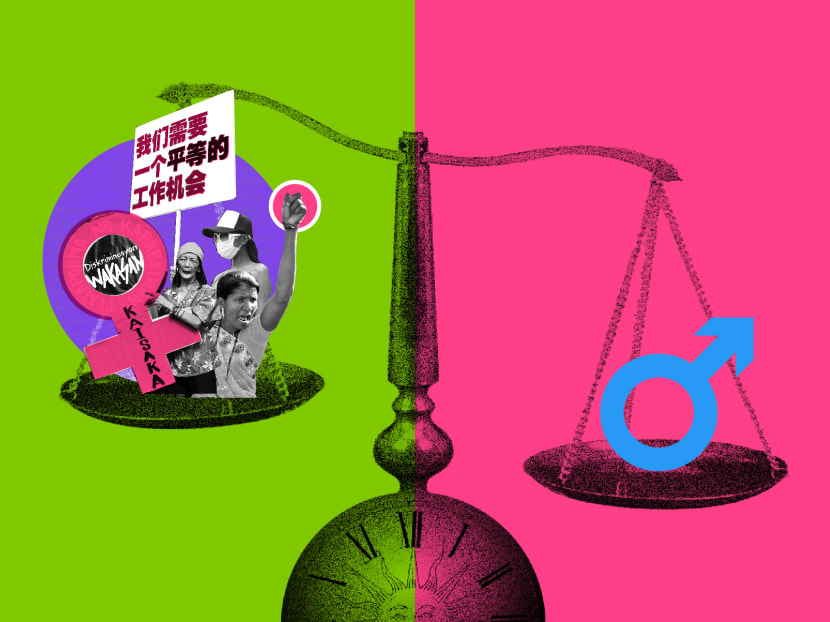Gender equality will take another 100 years: World Economic Forum
SINGAPORE — This generation, and even the next, are unlikely to see gender equality in their lifetimes, as it will take another century to close the gender gap between men and women worldwide, a new report has found.

Overall, Singapore ranked 54th among the 153 countries studied in the Global Gender Gap Report 2020.
SINGAPORE — This generation, and even the next, are unlikely to see gender equality in their lifetimes, as it will take another century to close the gender gap between men and women worldwide, a new report has found.
The gap is particularly wide in East Asia and the region, which includes Singapore, where it will take 163 years to close the gap at the current pace of change, the World Economic Forum (WEF) said in its Global Gender Gap Report 2020.
The annual report tracks the progress that 153 countries have made each year in closing the gaps between men and women on health, education, economy and politics.
WEF founder and executive chairman Klaus Schwab said this year’s report highlights the growing urgency for action: “At the present rate of change, it will take nearly a century to achieve parity, a timeline we simply cannot accept in today’s globalised world, especially among younger generations who hold increasingly progressive views of gender equality.”
SINGAPORE RISES IN RANKS
The gender gap is evaluated based on four main areas — economic participation and opportunity, educational attainment, health and survival, and political empowerment. In all four areas, women in Singapore lagged behind men, although the gap was quite narrow in education attainment and health and survival.
Overall, Singapore ranked 54th among the 153 countries. That is, Singapore has the 54th narrowest gender gap in the world.
In 2006, when the WEF first began studying the gender gap, Singapore had ranked 65th.
The report noted that women in Singapore are well-represented in traditionally segregated industries such as engineering and cloud computing, and the marketing profession has in fact reached gender parity.
ECONOMIC GAP WIDENING WORLDWIDE
While the gender gap in politics, education and health has narrowed worldwide, figures show that the gap in economic participation has widened, the WEF said.
The report also found that based on the progress that has been made since the WEF first began evaluating gender gaps in 2006, this economic gap will take 257 years to close, compared to 202 years last year.
Although there has been a 2 per cent increase in the number of women in managerial roles globally in the last year, the overall number is still low, the WEF said.
Women also continue to lag behind in labour force participation, income earned and access to financial services.
Figures show that on average, about 78 per cent of men between the ages of 15 and 64 are in the labour force, compared with 55 per cent of women.
Furthermore, the average woman’s annual income is about US$11,000 (S$14,900), as compared with US$21,000 for the average man.
This could be due to a higher share of women working part-time and fewer hours, and working in occupations where they are lesser-paid than men, the report said.
The report also found that as many as 72 countries limit women from specific social groups from opening up a bank account or obtaining credit. In 25 countries across the world, not all women have full inheritance rights.
GENDER INEQUALITY IN JOBS IN THE FUTURE
A major challenge in closing the economic gender gap is the lack of women in emerging roles, the report added.
An analysis produced by WEF in collaboration with LinkedIn shows that this gap is most prominent in cloud computing, where only 12 per cent of professionals are women. Similarly, only 15 per cent of engineers and 26 per cent of professionals in the data and artificial intelligence sector are women.
However, women are found to outnumber men in two fast-growing job clusters — content production and “people and culture”.
The WEF report said leaders can address the gender gap by ensuring women are equipped through the upgrading of skill sets, implementing diverse hiring policies, and creating inclusive work cultures.
TOP 10 MOST GENDER-EQUAL COUNTRIES
Iceland
Norway
Finland
Sweden
Nicaragua
New Zealand
Ireland
Spain
Rwanda
Germany








